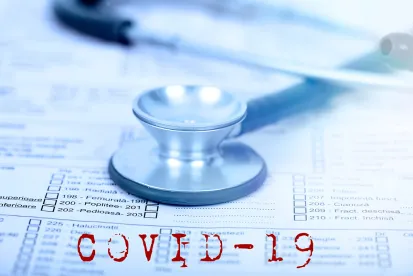The COVID-19 pandemic created an environment where many companies are fighting unprecedented constraints to assist their customers and keep their businesses alive. As they tackle new demands daily — on their businesses and capabilities to operate in the “new normal” — companies should not overlook how their current actions will impact potential exposure to product liability claims related to COVID-19.
Leading plaintiffs’ firms are looking for ways to begin an onslaught of class action and mass tort lawsuits. While the country looks for solutions, plaintiffs’ firms are already advertising and filing lawsuits in an attempt to capitalize on the pandemic. Media reports indicate that some plaintiffs’ firms are even teaming together to create a COVID-19 task force to ensure they have the resources necessary to address an increase in litigation.
Although there are numerous issues to monitor during this ongoing pandemic, the best time to start protecting against product liability claims is right now — before it is too late. As the old saying goes, the best time to kill a snake is when it is young.
What Companies Should Be Concerned? What Products Could Become Targets?
Product liability claims are not limited to manufacturers. Product distributors, parts or component suppliers, sales representatives, and others are often surprised when they see their names included in a product liability lawsuit. Depending on the jurisdiction, claims may be brought against manufacturers, distributors, sellers, and other entities or individuals in the chain of commerce. A plaintiff’s goal is to get as many solvent defendants with deep pockets as possible.
Plaintiffs’ attorneys are filing and advertising for product claims related to:
-
failing to warn about the presence of COVID-19 in a manufacturing or distribution facility.
-
sanitizers, protective gear and disinfectants that misrepresent the protection against viruses, germs and bacteria.
-
products claiming to protect against COVID-19.
-
dietary supplements and other foods that allegedly cure, treat, or mitigate COVID-19 and its symptoms.
-
drugs and vaccines claiming to treat COVID-19 or lessen its impact.
-
testing claiming to detect COVID-19 or related antibodies.
-
products claiming to boost immune systems.
-
exposure to COVID-19 from contaminated devices or packaging.
-
failing to warn about potential side effects or impacts caused by drugs or devices.
These claims could be brought by individuals, companies, or on a mass tort or class action basis by groups such as health care workers, employees, and consumers.
Companies could also expose themselves to actions brought by governmental entities. The U.S. Food and Drug Administration (FDA) and Federal Trade Commission (FTC) have already issued warning letters to companies for selling fraudulent COVID-19 products. FTC Chairman Joseph Simons indicates the “warning letters are just the first step,” and the FTC is “prepared to take enforcement against companies that continue to market this type of scam.” A list of FTC warning letters and actions are available on its website.
The Next Step: What Types of Claims Are Plaintiffs Going to Bring?
Attorneys certainly do not have a crystal ball, and we recognize that novel tort claims will likely emerge from the pandemic. We can, however, lean on our experience to understand the types of claims most likely to be brought. Product liability claims generally focus on whether a product is “defective.”1 Lawsuits related to COVID-19 may include allegations that a defendant:
-
defectively designed a product.
-
defectively manufactured or assembled a product.
-
sold or marketed a product with insufficient labeling, improper instructions or inadequate warnings.
-
acted with negligence by breaching a duty to the plaintiff.
-
fraudulently misrepresented a product’s characteristics or abilities.
-
breached an express warranty.
-
breached an implied warranty, such as the implied warranty of merchantability or implied warranty of fitness for a particular purpose.
-
is strictly liable for a defect that made a product unreasonably dangerous.
Although the list of potential claims may seem overwhelming, plaintiffs oftentimes attempt to attack every angle and see what claims stick. These tactics can quickly increase costs and further emphasize the need to proactively protect against litigation. Plaintiffs’ lawyers are often less concerned about the merits of their cases than the number of cases. Their goal is to accumulate a sufficient volume of claims to become an economic threat to the existence of the defendant and thereby force a quick “global” settlement.
Where Does the Law Stand on Tort Immunity?
Just as important as understanding to what claims companies may be exposed is understanding what claims plaintiffs cannot pursue. With the Public Readiness and Emergency Preparedness Act (PREP Act), the Pandemic and All-Hazards Preparedness Reauthorization Act, and the U.S. Department of Health and Human Services (HHS) declaration, the government sought to expedite the design, development, testing, manufacture and administration of drugs and devices designed to diagnose, treat, prevent, mitigate or cure COVID-19. Further analysis of the protections provided are discussed in a recent client alert. It is, and will remain, important for companies to stay apprised of actions at the federal and state levels bearing on tort immunity. At this point, there have been a few significant measures taken at the federal level:
-
On March 10, 2020, the HHS Secretary issued a PREP Act Declaration immunizing defined entities and individuals from liability arising from the manufacture, testing, development, distribution, administration and use of certain COVID-19 response products. Our prior alertexplained immunity under the PREP Act Declaration.
-
On March 27, 2020, President Trump signed the Coronavirus Aid, Relief and Economic Security (CARES) Act to provide emergency assistance for the COVID-19 response. In part, the CARES Act incentivizes businesses to produce and distribute critically needed respiratory protective equipment — like masks and respirators — by granting additional liability protection to these device manufacturers. The CARES Act extended the protections provided in the PREP Act Declaration to entities and individuals by granting additional liability protection to manufacturers of respiratory protective equipment. We discussed how the CARES Act expanded immunity in a previous alert.2
As the legal landscape surrounding COVID-19 changes, companies must monitor these changes and maintain an ongoing understanding of how they impact their operations. Faegre Drinker continues to monitor developments, and our alerts on the PREP Act and CARES Act are available to bring you up to speed.
What Steps Can Companies Proactively Take to Limit Exposure?
The steps companies should take are unique to their industry, products, operations, and other individualized factors. There are, however, many generally applicable preventative measures. As mentioned, it is vitally important for companies to understand how the PREP Act and CARES Act may provide immunity from claims related to manufacturing, testing, developing, and distributing of, among other things, “covered countermeasures.” The links above provide additional Faegre Drinker resources for each of these topics. Companies should also research their state’s Good Samaritan lawsto understand whether additional protections exist. Companies should also check whether there is an “innocent seller” statute that may provide immunity.
Marketing materials, labels, instructions, warnings and other representations should be thoroughly reviewed for accuracy. These materials include, but are not limited to, traditional handouts, product inserts and labeling, social media posts, and website content. Product claims and representations should be founded in facts and, if applicable, science. Further, companies may need to provide additional warnings if COVID-19 has impacted their product or changed its risks. Federal preemption defenses may also exist if a warning or instruction is federally mandated.
Companies should also review guidance provided by the Centers for Disease Control and Prevention, FDA, Occupational Safety and Health Administration, and state and local governments. The guidelines and advice provided by these entities could be cited to establish a standard of care in defense of a future negligence claim. Businesses need to know how these guidelines impact their operations, so they can proactively act to avoid future litigation.
Entities should review their insurance policies and other contracts to understand what types of claims and issues are covered. This could range from liability policies to supply chain and distribution contracts. As always, companies should timely notify their insurance carriers when they receive a claim. Express and implied warranties should be clearly disclaimed when appropriate. Businesses should also consider excluding third-party beneficiaries from contracts, unless they are component or parts suppliers, in which event they should seek vendors’ endorsements.
Research should be done to analyze preventative measures to protect employees and consumers from contact-based transmission. In addition to potential product contamination, lawsuits have already been filed by employees against their employers for allegedly contracting COVID-19. Businesses throughout the distribution chain should consider what measures they can take to disinfect products, shipping materials, and the individuals handling them. Additional product testing may be necessary to limit potential defects. Potential due diligence may include contacting suppliers, vendors, and other business partners to understand what steps they are taking. Further, new business relationships should be thoroughly vetted.
It is important for companies to remind employees to follow company policies and legal requirements, such as product safety plans, incident reporting, document retention, and quality control. Employees should be promptly and clearly notified of any changes. Strict recordkeeping and sound guidelines are important during these unprecedented times. New employee training may be necessary to address changing protocols.
Companies Should Continue to Expect the Expected — and Be Ready for Incoming Litigation.
There will be a surge of product liability claims related to the COVID-19 pandemic. Plaintiffs law firms are already preparing. Companies must take proactive steps to understand what claims enterprising plaintiffs might bring, understand how new laws protect their businesses, and take steps to limit their exposure to costly litigation.
Footnotes
-
The standard for a “defective” product is jurisdiction specific.
-
The Defense Production Act (DPA) contains a provision providing immunity from contractual liability for any act or failure resulting, directly or indirectly, from compliance with a DPA order. 50 U.S.C. § 4557. It plainly applies where a company breaches an existing contract to comply with the DPA order, but does not apply to tort liability. See In re Agent Orange Prod. Liab. Litig., 597 F. Supp. 740, 843 (E.D.N.Y. 1984), aff’d, 818 F.2d 145 (2d Cir. 1987).






 />i
/>i

